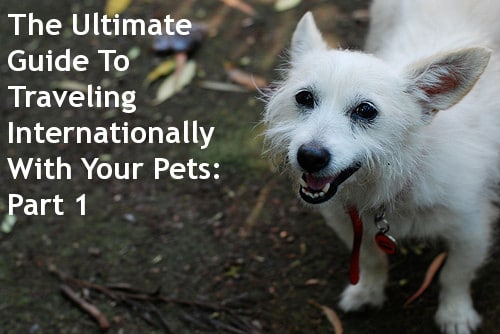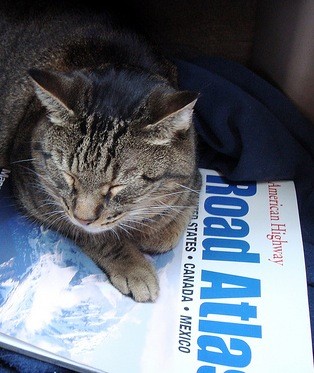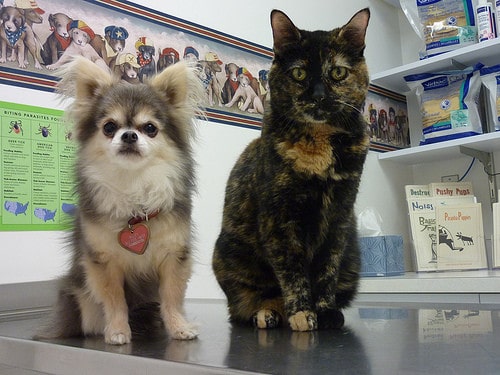Traveling with your pets on a short road trip can seem like a daunting task, let alone taking them anywhere internationally. The process of traveling with your pets internationally actually isn’t as complicated as many traveling-pet-owners initially assume. It’s a matter of solid preparation well before your flight, a few trips to the vet, and some added steps on your existing flight plan.

For this post I’m sticking to air travel and talking about cats and dogs when I refer to “pets”, since most all other animals are regarded by airlines and governments as “wildlife” and are subject to different requirements.
Warning! Don’t Book Yet
You could easily end up out of a plane ticket if you book first for yourself and try to make arrangements with your pets. First thing’s first, don’t get ahead of yourself, no matter how cheap that last minute flight is.
 First, Get Your Pets Ready
First, Get Your Pets Ready
It’s a terrible idea to pick up your dog or cat who has never been in a car before and fly them halfway across the world. Fortunately frequent and gradually extended car rides are good test runs to get your cat used to traveling and your dog prepared for long trips. There are many tips for flying with pets and methods to prepare for air travel, here are just a few of them:
- Tips For Long Flights With A Small Dog
- Have Dog, Will Travel: Tips For Taking Pet On The Road
- Tips For Road Tips With Pets
- Preparations And Tips For Flying With Pets
- How To Travel With Pets
Assuming your pets are ready, now it’s time to get you (the owner) up to speed as well.
Two Important Questions: Where From And Where Too?
You’ll need to start planning at least 3 months in advance, especially if it’s your first time traveling internationally with pets. Every nation has their own pet import requirements which vary based on your originating country.

Specific Destination Information
- Pet Relocation’s International Requirements Map
- Traveling With Pets From The US To Europe
- How To Bring Your Pets To The US
The most reliable place to find a country’s pet import requirements are from its embassy. Find the contact information for any embassy around the world with EmbassyWorld, and if you can’t find any information online, give them a call. Pet requirements change often so don’t go on old information, hearsay, or what you “think” is right.
 More International Pet Travel Considerations
More International Pet Travel Considerations
- Make sure to look up the information for countries you may have layovers in.
- Dog owners should check to see if there are any breed (e.g. pit bull) import restrictions.
- Also, many countries prohibit the export of certain native breeds, be sure to check export restrictions as well.
- Many countries don’t accept puppies under 12 weeks old.
- Check what the requirements are for your home country. Some require blood tests to be done 3 months prior to return so a 1 month trip may not be feasible.
Hopefully by now you know about any applicable restrictions and (importantly) all of the vaccination requirements. Most immunizations have some sort of time restrictions and must be done (e.g. two weeks) before traveling and pets typically need to be micro-chipped as well.
 Vets, Vets, And More Vets
Vets, Vets, And More Vets
You’ll be going to the veterinarian at least once, if not twice or three times depending on the medical requirements of your destination nation. It’s important to note that while many vets are aware of international travel requirements, many are not. Print out and take all of the requirements you learned of from the embassy as well as any specific forms you downloaded to each vet visit.
- Get all of the required shots and any shots that you cannot verify were done in the past.
- Some countries require more current vaccinations than your pet may already have. Redo any shots that need an update (only if the vet says it’s OK of course).
- Get a “pet passport” – most veterinarians will have them – they list all of the shots your pet has received, along with the relevant dates.
- Keep the pet passport and all other medical papers from the vet; you will need them when you take your trip.
The veterinarian visits are arguably the most important part of the international pet travel process. Neglecting or skimping them can result in quarantines for your pet (nobody wants that), or an immediate return back. Don’t make things more expensive or stressful for your pet than they need to be by being lax with the paperwork.
Next Up: Booking, Flying, And Arrival
Tomorrow in Part 2 of the Ultimate Guide to Traveling Internationally With Your Pets you’ll get down to making the actual arrangements with the airlines. That will all seem like a piece of cake considering that much of the pet-travel work is upfront with trips back and forth to the veterinarian’s office, online research, and lots of paperwork.
[photos by: peregrinari (white dog-top image), mk30 (cat sleeping on road atlas), foolfillment (dog panorama), janerc (cat face closeup), adria.richards (dog and cat at vet)]












Valuable information for anyone considering traveling internationally with their pets. I especially like the advice for acclimating your pet to travel with car rides before hopping on the plane with them.
It makes it much easier for everyone involved 🙂
Great info as it can be really overwhelming to travel with pets – especially on long flights!
The airlines don’t make the information clear cut or easy to find!
From what I understand, this is one of the fastest growing categories of travel right now, as more and more people can’t leave their “kids” at home. very timely, and full of valuable info for any pet owner, for sure!
I didn’t know that, although I can see why. I hope the airlines eventually make the process easier — especially for the pets, which are much more than just ‘special cargo.’
Nice to have this info. in one spot. I’ll be moving with my cat next year, so this will be helpful.
Curious, from where to where?
Thanks so much for posting this. My family will be RVing around Europe for a year or so in 2011, and our dog is coming with us. What a relief to find your site and read a few encouraging words.
Warmly,
Renee
Sounds like a great trip; which countries do you have planned? Let me know if you have any other specific questions, I’ve been all over the world with my dog and cat and also have a site dedicated to the topic:
howtotravelwithpets.com